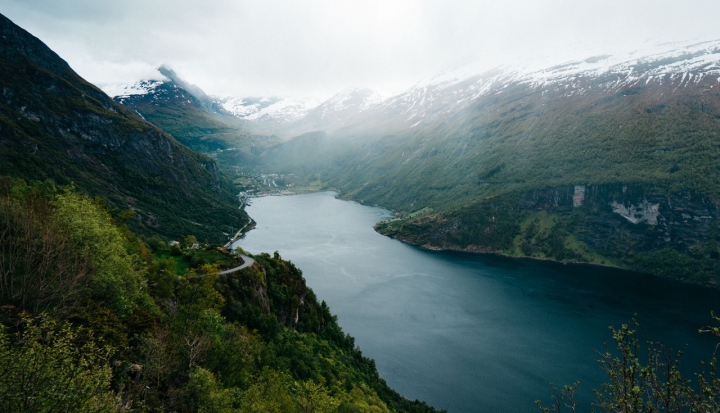One night when I was 6 years old, while walking outdoors before bed, I gazed at the sky and found myself wrapped in the vast mantle of stars, the Milky Way. Standing in awe, my body felt both small and large. In that instant I felt God.
Now, years later, that memory restores me when I feel overwhelmed by the devastation of God’s creation or when spiritual questions overshadow me. What is the meaning of life? What is my purpose here? My answer is that I am stardust created in love by the divine mystery.
The natural world has always taught us about God. Thirteenth-century mystic Meister Eckhardt said, “Creation is a revelation of God, a home for God, a temple for God.” But with the growth of industrialization, technology, materialism, and consumerism, we have been lulled to sleep, forgetting who we are and our place on earth.
E-mails, cell phones, television re-runs, fast food, microwave meals, and endless trips to shopping malls capture our energy. We find ourselves wondering about the meaning of it all. We do not have time to be concerned about water, global warming, and sustainable living. Yet the ecological crisis is really a moral and spiritual crisis as well, a crisis of the soul, as the late Pope John Paul II reminded us.
Our Catholic and Christian spiritual tradition—its saints, sacramentality, and practices—can help us to navigate this new challenge. In fact, the ecological crisis may very well lead us into a deeper relationship with God and help awaken us to the true meaning of life, which is loving all that exists.
Passionist Father Thomas Berry, the most influential Catholic eco-theologian, speaks of this time in history as a moment of grace, yet because of the urgency of this crisis, the transformation of our understanding of who we are must take place in a short period. Celebrating the wonders around us is part of our vocation to love and serve God and might very well be the path that can transform our lifestyles from consumerism to sustainability.
Talk to your brother and sister
If we love something we cherish it. St. Francis of Assisi, the patron saint of ecology, was so in love that he called everything in creation brother and sister. His prayer, the Canticle of Creatures, proclaims, “Praised be you my God through Sister Mother Earth, who sustains and governs us.”
How would I live if I allowed earth to “govern” me? St. Francis invites us truly to understand ecology, which comes from Latin oikos and means “home.” Living in my home charges me to be a good steward.
When we are at home, our eyes and ears open to moments of grace in which God breaks through our sleepiness. Visionary mystic Julian of Norwich in the 14th century dedicated her life to seeing God within the smallest elements. “And in this [God] showed me something small, no bigger than a hazelnut, lying in the palm of my hand. . . .I thought that because of its littleness it would suddenly have fallen into nothing. And I was answered in my understanding. It lasts and always will, because God loves it; and thus everything has being through the love of God.”
A glance out my window at yellow finches eating thistle seeds, an evening walk in fading sunlight, or a prayer of gratitude to Sister Water before I quench my thirst awakens me to the moment that is holy and to be cherished. I am part of what Berry calls the “sacred earth community,” through which the divine is revealing itself to us.
Spiritual practice makes perfect
But it is our practices—spiritual and otherwise—that will make a difference in the way we care for creation. In the past we often compartmentalized our lives into holy actions and mundane tasks. If we are to care for earth for future generations, the holy and mundane must meet.
Twentieth-century Jesuit and mystic Pierre Teilhard de Chardin wrote, “Up until now to adore meant to prefer God to things by sacrificing them to God. Now adoration means joining our creative activity to God’s to bring the world to fulfillment by effort and intellectual exploration.”
St. Brigid in the fifth century knew the meaning of adoration: “Christ dwells in all creatures,” she said. Honored as patroness of cattle and dairy workers, she tended milk cows, cared for wells, and founded monasteries. In our busy lives, is it not essential that we care for water and even plant a seed for food? Such actions lead us to a sense of balance, which was taught to us by Blessed Kateri Tekakwitha, another patroness of ecology, whose name means “the one who puts everything in order.”
Our Catholic sacramental celebrations also are places where we experience the divine as we immerse our senses in the gifts of oil, bread, wine, water, incense, and fire. From baptism to death we are surrounded by God’s creation. Our challenge is to extend the sacramental moments into our lives. Preparing food from scratch and blessing and sharing it at a dinner table can be sacramental moments. Eating is a prayerful act with enormous implications for our planet.
Healing the planet will require the spiritual practice of deep listening. Pope Benedict XVI said, “We can’t simply do whatever we want with this earth that has been entrusted to us. . .We have to respect the inner laws of creation, of this earth, we have to learn these laws and obey them if we want to survive. Existence itself, our earth, speaks to us, and we have to learn to listen.”














Add comment